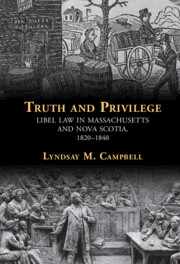Book contents
- Truth and Privilege
- Studies in Legal History
- Truth and Privilege
- Copyright page
- Contents
- Tables
- Foreword – The Osgoode Society for Canadian Legal History
- Acknowledgments
- 1 Introduction
- 2 The Common Law’s Diverging Paths
- 3 The Transformation of Privilege
- 4 Truth, Privacy and Authority
- 5 The Individual Conscience and Blasphemous and Obscene Expression
- 6 Private Defamation Suits
- 7 Conclusion
- Book part
- Bibliography
- Index
- Publications of the Osgoode Society for Canadian Legal History
4 - Truth, Privacy and Authority
Published online by Cambridge University Press: 16 December 2021
- Truth and Privilege
- Studies in Legal History
- Truth and Privilege
- Copyright page
- Contents
- Tables
- Foreword – The Osgoode Society for Canadian Legal History
- Acknowledgments
- 1 Introduction
- 2 The Common Law’s Diverging Paths
- 3 The Transformation of Privilege
- 4 Truth, Privacy and Authority
- 5 The Individual Conscience and Blasphemous and Obscene Expression
- 6 Private Defamation Suits
- 7 Conclusion
- Book part
- Bibliography
- Index
- Publications of the Osgoode Society for Canadian Legal History
Summary
Chapter 4 focuses mainly on the evolution of the truth defense in Massachusetts; in Nova Scotia truth was a minor chord. In Massachusetts civil cases, however, judges systematically sought to contain truth and make it risky to plead, circumventing clear legislative intent to expand the reach of the truth defense. Special pleading was a casualty of this process. Similarly in criminal cases, judges ensured that a person accused of libel had to prove both truth and “good motives and justifiable ends”: neither well-intentioned but false, nor true but ill-meant statements would be protected. The key dynamic shaping this evolution was tension between reformers – abolitionists, temperance advocates, antimasons, Methodists and others – and more established, respectable men who did not wish to see their wives, children and other household subordinates drawn toward causes or imbued with knowledge of which they did not approve. Revealing unpleasant truths about reformers’ characters was much more palatable to courts than the same sorts of disclosures about those who defended orthodoxies. The idea that good intent was enough to save an accused person and that the defense could lead evidence of truth that might surprise the prosecution both fell, when it appeared they might save a reformer.
Keywords
- Type
- Chapter
- Information
- Truth and PrivilegeLibel Law in Massachusetts and Nova Scotia, 1820-1840, pp. 162 - 232Publisher: Cambridge University PressPrint publication year: 2021

